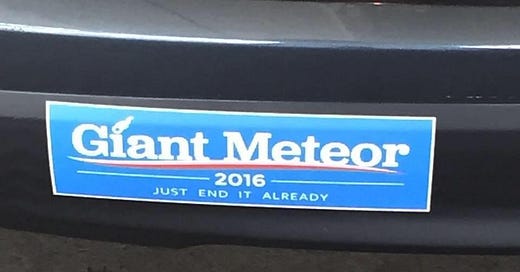Somewhere, as I was stumbling around at 0430 before my beloved coffee kicked in, I read a headline that simply said ‘1,000 hours’. That could have been a description of how long we seem to hear people drone on about politics in this country without taking a breath. It could have been a round number to nearly how long we will before the All Star Game (actually, I think they play that ho hum event at about 1160 hours but round numbers often appeal). I suppose it could even have been a number for hours the dedicated folks have tried to figure out what happened in Baltimore Harbor when the Key Bridge collapsed.
I can’t find the article now but I am confident referred to the number of hours Britain must endure politicking before the general election Prime Minister Rishi Sunak called for 4 July. 1000 hours comes down to just about 41 days which is nearly the 42 days (and he did call the election yesterday which means X minus 1) British politicians campaign for their seats in the House of Commons.
42 days. That is the entirety of the pain the British public endures. That is it.
Lucky dogs.
I was in Britain during the summer of 1983 as the Iron Lady ran her initial general election. As a Yank with deep interest in politics, it was baffling that they could do that whole democratic deal in six weeks.
Americans today endure a campaign lasting roughly 35,000 hours for the Chief Executive. The day following the election—not the day of the inauguration—polling actually starts for the next cycle. I have heard the speculation kick in, infuriating me as I and millions of others begged for respite. But the news cycle and those in the politix business—a huge one these days—demand a perpetual campaign.
Oy vey. My head hurts and hurts and hurts.
But this is freedom of speech or freedom of assembly or one of the other things we claim to be doing with political processes in this country. Those are falsehoods to me as it’s merely a process to gin up more reasons for politicians to spend money to fund consultancies, polling outfits, campaign venues, and all the other associated stuff.
By the end, we just want to be done. As this photograph from August of 2016 indicated, we are worn out moths before it ‘ends’. No wonder we get such wretchedly ignorant folks in power too often. Not always by any stretch but way too often for running ‘the most powerful country in the world’.
Britain’s Prime Minister had to declare an election before 28 January when their system, with its unwritten constitution, expected a popular vote. Sunak is gambling that things will deteriorate, I suspect, between 4 July and 28 January so he named our Independence Day for the grand event (it’s also a friend’s birthday in Edinburgh so lots of folks in lots of places will celebrate something).
British campaigning in the 1980s was pretty straightforward. Yes, there was literature put in door mail slots. Yes, candidates were the subject of the various newspapers’ reporting. Yes, the parties actually mattered because the Parliamentary system depends on a party winning a majority to elect a Speaker from within its ranks. The party leaders unveil policy mainfestos for voters to ingest, then support or oppose with their ballots. The difference from our system is that party discipline must hold if one has any chance of getting from the ‘back bench’ to a position as a Cabinet Secretary, thus viability for loftier roles down the line.
In our system, party loyalty and discipline were largely casualties of our demands for reform in the Watergate Era when we rejected dishonest politicians (ok, well we did back then), decisions made among cigar-smoking bubbas in back rooms while women, minorities, and ‘the out crowd’ were ignored (and we wonder why our coalition politics is within the Party turns out to b messy), and party conventions as the best place to select a national nominee (some states embraced primaries as more democratic but also prone to skew candidates to the far edges of the party rather than as centrists).
Loyalty to the head of the Republican Party is back in vogue under former President Trump. Time will tell whether that lasts but political types in the United States still seem to pick and choose more than happens across the pond.
Candidates show up at people’s doors in Britain, not merely for glitzy media events. I opened the door one evening, when staying at friends’ home in the southern suburb of East Croydon, only to find this guy who I had seen on a flyer when I collected the mail earlier that afternoon. I was startled, needless to say. I offered to free him to go meet ‘someone who can support you’ but he insisted on the courtesy (seriously) of answering any questions I had about the mainfesto or the campaign. Talk about mindblowing for an American politics junkee.
There are trade offs, of course. The press never feels it gets to grill—I mean question—pols in Britain adequately with this short cycle. Door to door visits as I just described May not be as common as they were forty years ago as the number of voters to reach is bigger. Missteps by any politician at some point in this 1000 hour marathon can be fatal with so little time to recover.
But the weariness, the astronomical spending on an election, the dehumanising of opponents simply doesn’t apply to the same degree. I know U.S. electoral advisors began appearing when Tony Blair led Labour to victory in the late 1990s but I am not sure anything can come close to our insanity.
By the morning of 5 July, America will still be independent, my friend Richard will be 59, and someone will be awaiting that invitation to ‘kiss hands’ of the King as the next resident of 10 Downing Street. Keir Starmer is leading in the polls. The Tories took power-in coalition or alone—fully 14 years ago so their appeal is thin. Five MPs stepped down since Sunak surprised everyone with this election decision yesterday. However, as I have said in other columns, life is never made of straight line decisions so the British voters are relishing their chance to make the choice for who will attempt to govern this post-Brexit place.
Do I wish we had shorter election cycles? You bet but we have our reasons and they have theirs. Stay tuned, however, as I bet we can stock up on enough provisions for the 1000 hour show Britain provides while I am less confident any of us want to experience the several thousand hours we still face before November.
I welcome your thoughts, criticisms, rebuttals, or anything else. Thank you for reading today’s column. Please feel free to circulate it. Thank you heartily to the subscribers who give me the wherewithal to read several U.K. sources to get a range of views on what is underway there. You are incredible supporters.
The Blues flew away yesterday and the graduates disperse after tomorrow afternoon, heading to their ships, more specialised training, and defending our nation. We locals look forward to the month or so (maybe 750 hours, I am guessing. LoL) when we can park downtown, stroll around, and savour our town before the summer rush associated with 4 July and the arrival of the plebes. But, we love Annapolis, its history, and its privilege as a destination regardless of the minor annoyances: more excuses for the water taxi!
This was our sunrise.
Be well and be safe. FIN






I think we are too big and diverse to get it all done in 1,000 hours. Yes, it goes on too long, but I wouldn't wish to see it run from August to early November. The Presidential candidates need to be out and about, be it New Hampshire or Iowa. And, I was delighted to see DJT go to the Bronx and talk about William Leavit. We are talking, up here in Massachusetts, in ignorant ways, about generational wealth. Mr Leavit allowed by folks to start to build generational wealth.
Regards -- Cliff